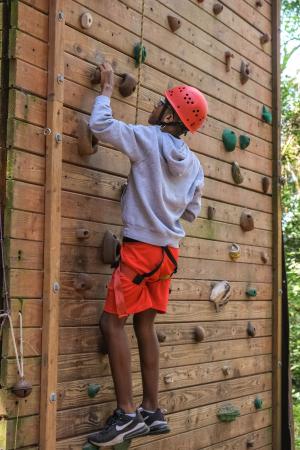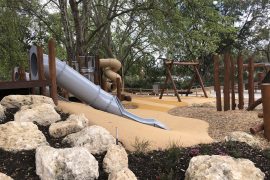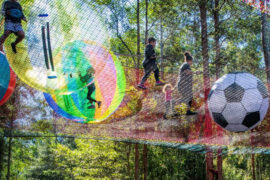Unpack the Fun: Your Guide to Choosing the Best Camp for Your Child
Welcome, amazing parents! If you’re on the hunt for the ideal summer camp that will have your kids bubbling over with excitement, you’re in the right spot. In this comprehensive guide, we’re going to help you navigate the colorful world of camps. Whether you’re looking for an adventure-packed outdoor experience or a place where your little ones can explore their creative side, we have all the tips and tricks to make the search as smooth as a canoe ride on a calm lake.
Understanding the Different Types of Camps
To start your journey, it’s essential to understand the various types of camps out there. Each camp has its unique flavor, and finding the right fit for your child’s interests and personality can make all the difference. Here’s a quick overview to get you started:
- Day Camps: Perfect for younger children or first-timers. These camps usually run during the day, with evenings spent at home.
- Residential Camps: These camps offer a more immersive experience, with children spending nights away from home, often in cabins or dormitories.
- Specialty Camps: Catered to hone a specific skill or hobby, such as music, sports, science, or art.
- Adventure Camps: These focus on outdoor activities and typically include hiking, kayaking, rock climbing, and more.
- Travel Camps: Take your child to new places, where they can explore different cultures and environments.
- Inclusive Camps: Designed to accommodate children with special needs, ensuring everyone has the chance to join in the fun.
Finding Camps: Where to Start Your Search
Now that you have an idea of the types of camps available, you might be pondering, “Okay, but how do I find these camps?” Worry not, here are some fantastic starting points:
- Online Camp Directories: Websites like the American Camp Association (ACA)and CampPage offer searchable directories that can help you pinpoint camps by type, location, and age group.
- Social Media and Forums: Parenting groups on platforms like Facebook or Reddit can be goldmines of information, with real reviews and tips from other parents.
- Schools and Community Centers: These local hubs often have partnerships with camps and might offer brochures or even organized visits.
- Word of Mouth: Never underestimate the power of a good old natter! Chat with fellow parents, friends, and family for personal recommendations.
Prioritizing Your Child’s Interests
As you start to browse through camp options, sit down with your child and talk about interests and passions. Does your child dream of scoring goals on the soccer field or perhaps conducting wacky science experiments? By prioritizing their interests, you can ensure they’ll be engaged and excited about their camp experience. Strike up a conversation with these helpful prompts:
- What activities make you lose track of time because you’re having too much fun?
- Is there something new you’ve wanted to try but haven’t had the chance to yet?
- When you think about camp, what are you most excited about?
Considerations for Choosing the Right Camp
Once you’ve got a handle on your child’s interests, it’s time to consider other important factors that will influence your decision:
- Duration and Timing: Whether it’s a week-long or month-long camp, and the time of year it’s offered can affect your choice.
- Location: Do you prefer a camp close to home or are you okay with your child traveling a bit further?
- Budget: Camp costs can vary widely, so it’s important to identify your budget early on in the process.
- Staff Credentials and Safety: Ensuring the camp has accredited staff and up-to-date safety procedures is non-negotiable.
- Camp Culture and Philosophy: The camp’s values should align with your own, creating a positive environment for your child’s growth.
- Size and Camper-to-Staff Ratio: Smaller camps often offer a more personalized experience, while larger ones may have more diverse activities.
Embarking on the search for the perfect camp is an exciting adventure within itself, filled with opportunities for your child to grow, learn, and have an absolute blast. In the next section, we’ll delve even further, giving you insider tips on evaluating camp reputations, organizing camp visits, and preparing your kiddo for the time of their life. Stay tuned!

Evaluating Camp Reputations: Due Diligence for Peace of Mind
Just like a detective with a magnifying glass, it’s your job to inspect the camp’s reputation. Here are a few investigative tasks to help you uncover the best and most trustworthy camps:
- Check Accreditation: Look for camps accredited by recognized organizations, such as the ACA, which meets up to 300 health and safety standards.
- Read Reviews and Testimonials: Websites, forums and even the camp’s own website are great places to find honest feedback from other families.
- Ask for References: Don’t shy away from asking the camp for references. Speaking to other parents can give you firsthand insights.
- Visit the Camp: If possible, visit the camp in person to get a feel for the place and how it’s run.
Organizing Visits to Potential Camps
A camp visit can be a revealing adventure. To make the most of your visit:
- Plan Ahead: Contact the camp to schedule a tour and find out when they have open houses.
- Involve Your Child: Bring your child along to gauge their comfort and interest level.
- Prepare Questions: Have a list of questions ready to ask the staff about daily schedules, safety procedures, food, and medical care.
- Observe: Watch how the staff interacts with the children and note the cleanliness and safety of the facilities.
Five Things Parents Should Know When Preparing for Camp
Finally, let’s talk about preparation! Setting your child up for a successful camp experience involves some groundwork. Here are the top five things every parent should know:
- Packing Essentials: Most camps provide a packing list. Don’t forget labels with your child’s name on all items, and consider packing a little comfort from home, like a favorite stuffed toy.
- Health and Safety: Make sure all immunizations are up-to-date and inform the camp about any allergies or health concerns. Pack a small first aid kit if allowed.
- Communication Plan: Discuss with your child how they can communicate with you, and make sure they know who to talk to if they’re feeling homesick or need help.
- Financial Planning: Look into early bird specials, scholarships, or sibling discounts to help ease the financial investment.
- Emotional Preparation: Chat with your child about what to expect, and start encouraging independence in small ways before camp starts.
With these strategies and a pinch of preparation, you’re well on your way to finding a camp that will provide a world of fun and growth for your child. Remember, the perfect camp is one where your child feels happy, safe, and motivated to explore their potential. So grab your map and compass, intrepid parents – adventure awaits, and it’s time to find that magical camp that will create lifetime memories for your child!
Embarking on the search for the perfect camp is an exciting adventure within itself, filled with opportunities for your child to grow, learn, and have an absolute blast. Just imagine the stories and smiles your child will bring home—those moments will surely be treasured for a lifetime. So here’s to summer days filled with joy, discovery, and campfire songs that echo in the heart. Happy camping!
For more great articles please see here. For more information see here
Disclaimer
The articles available via our website provide general information only and we strongly urge readers to exercise caution and conduct their own thorough research and fact-checking. The information presented should not be taken as absolute truth, and, to the maximum extent permitted by law, we will not be held liable for any inaccuracies or errors in the content. It is essential for individuals to independently verify and validate the information before making any decisions or taking any actions based on the articles.




